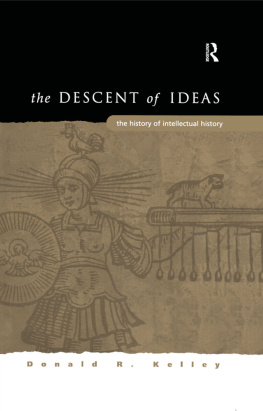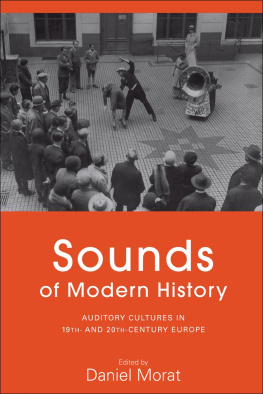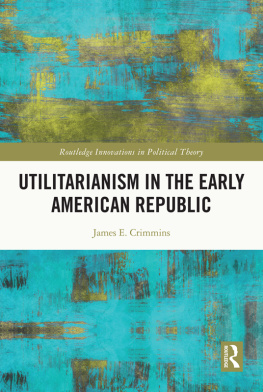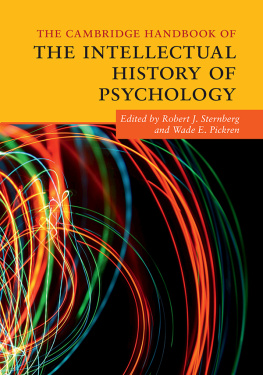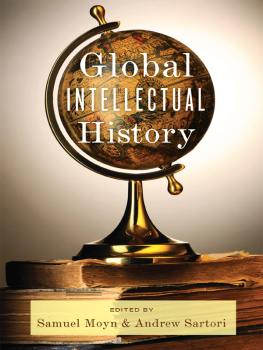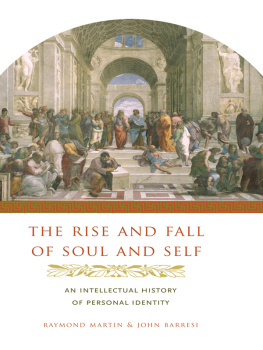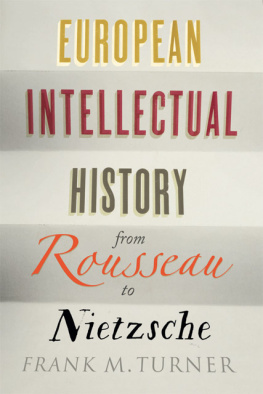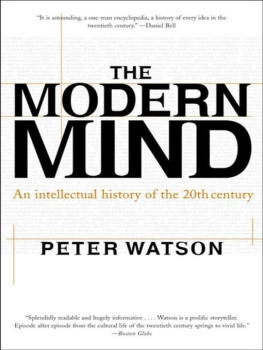To the editors and friends, past and present, of the Journal of the History of Ideas
Donald R. Kelley
Copyright Donald R. Kelley 2002
Donald R. Kelley has asserted his moral right under the Copyright, Designs and Patents Act, 1988, to be identified as the author of this work.
All rights reserved. No part of this book may be reprinted or reproduced or utilised in any form or by any electronic, mechanical, or other means, now known or hereafter invented, including photocopying and recording, or in any information storage or retrieval system, without permission in writing from the publishers.
Typeset by Manton Typesetters, Louth, Lincolnshire, UK.
This book is at least indirectly the product of my seventeen-year experience as editor of the Journal of the History of Ideas; but the debts I owe go back to my undergraduate and graduate mentors, especially to the late Paul Oskar Kristeller, Felix Gilbert, J. H. Hexter, Hans Baron, John Herman Randall, Jr, Marjorie Hope Nicolson, and Harry Levin - all of whom have served on the editorial board of this journal (except for Baron, who was a contributor). To this list I add the names of scholars who have added in many ways to my understanding of intellectual history, especially Hans Aarsleff, the late Lewis White Beck, Constance Blackwell, Ann Blair, Michael Carhart, Marcia Colish, William Connell, Julian Franklin, Anthony Grafton, Knud Haakonssen, Sarah Hanley, Maryanne Cline Horowitz, J. Paul Hunter, Joel and Karen Kupperman, I. Leonard Leeb, Joseph M. Levine, Edward Mahoney, Alan Megill, Dean Miller, Peter Miller, Martin Mulsow, Steve Nadler, Anthony Pagden, Peter Paret, Kathleen Parrow, John Pocock, Timothy Reiss, David Harris Sacks, J.. M. Salmon, Wilhelm Schmidt-Biggemann, the late Charles B, Schmitt, J. B. Schneewind, Ulrich Schneider, Gordon Schochet, Jerrold Seigel, Quentin Skinner, Bonnie Smith, Donald Verene, Frangoise Waquet, Daniel Woolf, John Yolton, and Perez Zagorin - many presently on the board of editors of the Journal. I have no doubt that they all support my project in our common field, whether or not they approve of my eccentric routes.
Much of the writing was done during a year at the Institute for Advanced Study in Princeton, that modern counterpart, for scholars, of the Abbaye de Theleme, and an extraordinary haven for rne at several points in my life. I have also profited much from support by the Folger Shakespeare Library, Woodrow Wilson Center, and Rutgers University, and from my association with the international Society for Intellectual History. Closer to home I have been sustained and improved in many ways by Bonnie, Patrick, and Patience Smith, John Kelley, and Robin Ladrach, who keep me in touch with so many important things besides and beyond the life of the mind.
D. R. Kelley
Introduction:
What was the History of Ideas?
We have a duty to think of the dead. It is the only way to remain in communion with them. Novalis
'What we call the history of ideas itself has a history,' wrote Joseph Mazzeo, referring to classical and Christian precedents. and thereafter the concept and term had a rich fortuna in European thought through the French eclectic school of the nineteenth century down to the time of the American philosopher Arthur O. Lovejoy and various contemporaries.
Ideas begin in the heaven of contemplation and end, for students of the human condition, in the sublunar realm of historical experience. Philosophers try to preserve the transcendent vision of Plato and the dialectical wisdom of Aristotle, but historians have discovered that they must remain in the cave of human discourse in which words and not ideas provide the medium of exchange and targets of inquiry. 'An idea, in the highest sense of that word', Coleridge The history of ideas may seem to bridge the gap between the ideal and the real, but this is an illusion to the extent that these ideas are already ('always already') incarnate in conventional language. This is one reason for the recent shift from 'history of ideas' to 'intellectual history' - and one reason why I speak of the 'descent of ideas'. Darwin's famous question in The Descent of Man was 'whether man ... is descended from some preexisting form', and this study follows an analogous line of inquiry into the early ancestry of intellectual history - except that, like modern revisions of Darwin, the story is not one of simple linear evolution.
The one constant in the writing of intellectual history has been an opposition, implicit or explicit, between an interest in creations of human thought and ingenuity and concerns with war, politics, and public institutions. The libraries are filled with histories of sieges and battles, complained J.-F. Montucla, the eighteenth-century historian of mathematics; it was time to look at the more positive side of human history, for here was revealed the 'human spirit' itself. And as Lord Acton wrote in 1861,
There is nothing which so favorably distinguishes modern from ancient historians as the importance they allow to the immaterial metaphysical agents in human affairs, and the attempts to trace the progress of ideas, as well as the succession of events, and the reaction of one upon the other.
Intellectual history is closely related to cultural history, being analogous to the polar modes of inquiry commonly known as internalist and externalist or the 'intellectualist' (or even 'spiritualist') and 'contextualist' - approaches. The first of these methods is located in individual psychology and mental phenomena, the second in collective behavior, inherited or learned practice, and cultural surroundings. For history this takes two forms. One is the habit of tracing ideas in terms of an inner dynamic, or familiar logic, similar to what the eighteenth century called 'reasoned' or 'conjectural' history.
Think of this polarity as complementary forms of inquiry undertaken within a horizon-structure of experience. The center of this intellectual space locates the historical subject (conscious, intentional, or even unconscious), or perhaps a single act of discovery, creation, or conceptualization - a pure spiritual or phenomenological moment that becomes a target of historical inquiry. The surrounding space encompasses the contexts of the central subject - the preconditions, influences, possibilities, resonances, connections, and effects involving other fields of cultural activity, states of disciplinary questions, and 'climates of opinion' - the 'past' being represented by residues in the present signifying otherwise inaccessible bygone experience. Beyond the circle of experience, beyond perhaps even the resources of language, we may imagine a transition from intellectual and cultural history to philosophical speculation and metahistorical criticism. In any case this is one way of imagining the problem from the standpoint of the human agent: intellectual history is the inside of cultural history, cultural history the outside of intellectual history; but in both cases 'ideas' must be brought down to a human level.

